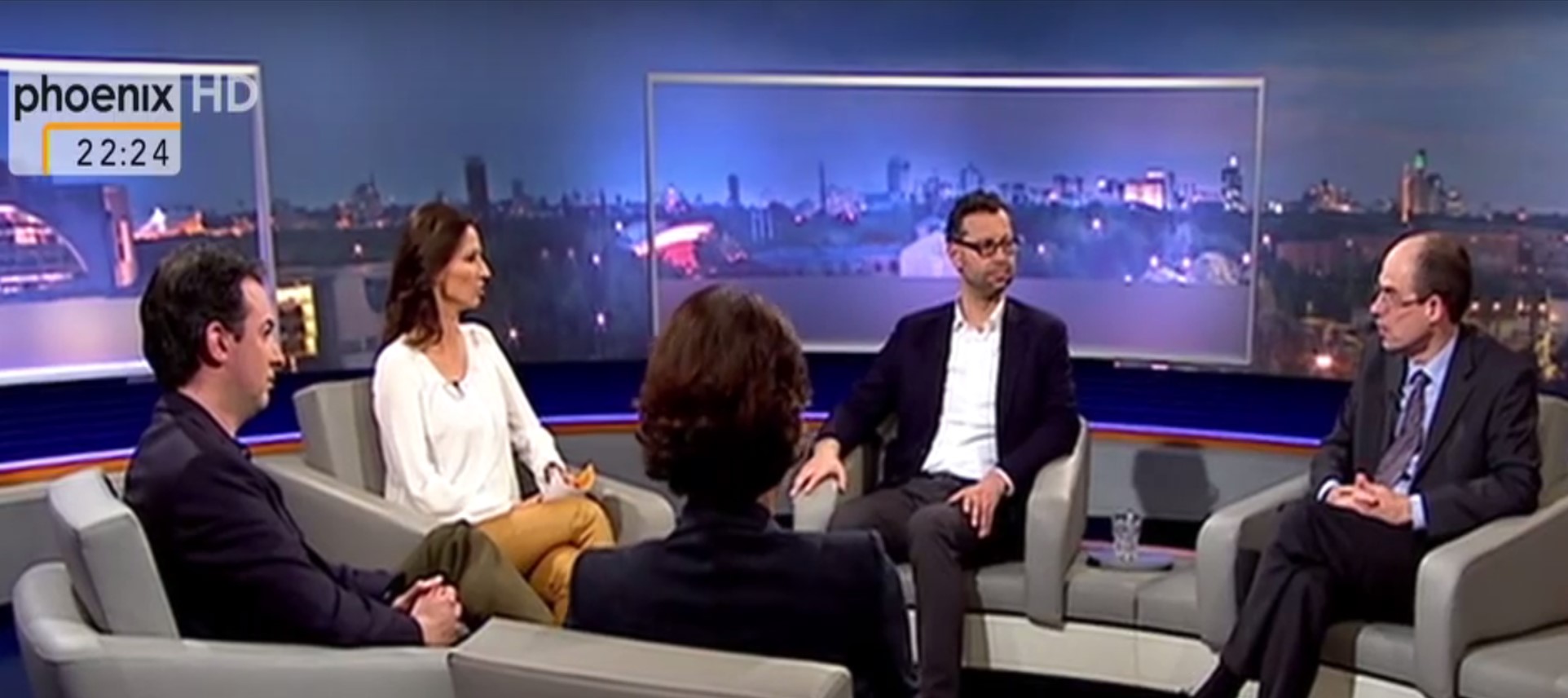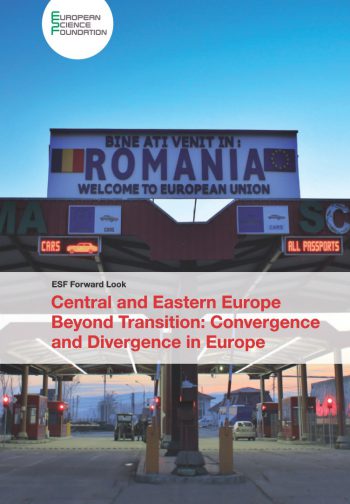Phoenix RUNDE über die europäischen Rechtspopulisten am 19.11.2013 – mit Pinar Atalay (Phoenix) Anne Mailliet (France 24-TV), Kai Olaf Lang (SWP, Berlin), Merlijn Schoonenboom (De Groene Amsterdammer) und mir.

Phoenix RUNDE über die europäischen Rechtspopulisten am 19.11.2013 – mit Pinar Atalay (Phoenix) Anne Mailliet (France 24-TV), Kai Olaf Lang (SWP, Berlin), Merlijn Schoonenboom (De Groene Amsterdammer) und mir.

Relating the Sustainable Governance Indicators
to the Quality of Democracy
Paper for the Workshop “Measuring Democracy”. IPSA Research Committee on the Quality of Democracy, DVPW-Arbeitskreis Demokratieforschung, Frankfurt/Main, 29 September – 1 October 2013
The Sustainable Governance Indicators (SGI) are a set of 147 detailed items and two aggregated indices that measure the quality of democracy (QoD), policy performance and executive governance in OECD member states. Two editions have been published since 2009 by the Bertelsmann Foundation, an NGO based in Germany. The SGI consist of qualitative expert assessments, country reports and data retrieved from official statistics. As the name suggests, the SGI have been designed to measure the quality of governance, a concept that overlaps with concepts of democracy or QoD, but has its distinct origins, ideational references and discourse communities.
Relaunching Post-Soviet Economic Integration
A paper presented at the ECPR General Conference 4-7 September 2013, Bourdeaux, European Consortium for Political Research
Abstract In November 2011, the presidents of Belarus, Kazakhstan and Russia agreed to establish a “Eurasian Economic Commission” (EAEK) charged with the development and functioning of the Customs Union and a “Single Economic Space” comprising the three states. Their presidents and other political actors referred to the European Union and its formation to frame these projects and the envisaged creation of a “Eurasian Union” until 2015. The paper studies how these references are emulated in Russian public discourse and the legal regulation of the EAEK. Combining theories of policy transfer and gradual institutional change, the paper conceptualizes different modes of emulation. A weak authority of the EU model and weak powers of integration advocates suggest a “facade emulation” where formal similarities coexist with persisting inherited practices and behavioral patterns. This hypothesis is confirmed by (1) labeling and framing strategies that relate the EU model to familiar ideas in Russian political culture and previous initiatives of post-Soviet integration and (2) a limited emulation of labels and organizational structures from the EU within an essentially intergovernmentalist institutional arrangement. Go to project page Download paper:Brusis_EurasianEuropeanUnionA Research Note for the Policy Planning Staff, Federal Foreign Office of Germany, 10 June 2013
Summary:
The aim of the proposed study is to analyze whether trade liberalization has facilitated market economy and democracy, how to reinforce this impact through complementary policies and how to use trade liberalization to achieve a democratization in Russia, Ukraine, Belarus and Kazakhstan. This study is to be elaborated in a cooperation between economists and political scientists, and its findings / policy recommendations are to be discussed and agreed with scholars from France and Poland. To organize this cooperation, the research questions need to be addressed and operationalized in different modules.
Staat und Wirtschaftsakteure in postsowjetischen elektoralen Autokratien, in: PVS-Sonderheft “Autokratien im Vergleich”, 2013, 298-323
Abstract
Why and how do ruling political elites co-opt private business actors through patronage and consultation? By testing different mixed models, the project examines whether and to what extent the openness of electoral authoritarian political regimes affects the extent of perceived patronage and consultation. Case studies on the political regulation of property rights and business interest representation in Kazakhstan and Russia document an expansion of the state-controlled economic sector, sanctioning of individual oligarchs and the inclusion of private business interests into politically managed consultation regimes. Conversely, in Ukraine a pattern of co-governing by influential business actors emerged during Kuchma’s presidency. This variation may best be explained by a focus on the governing strategies of incumbents rather than by economic conditions (resource rents, trade openness) or by concepts of elites as cohesive social groups.
Article in: West European Politics 36 2 2013, 405-425
Abstract
How well do electoral competition, ideological divides and territory-based cleavages explain the strategies of administrative-territorial reform chosen by political parties in Poland? The role of these logics is explored in the creation of regions and regional self-governments (1999), local electoral reform (2002), rules of adopting regional development projects (2006) and the creation of metropolitan regions (2008). The paper provides evidence supporting the salience of vote- and office-seeking strategies, the rise of a national-conservative opposition to decentralisation associated with the weakening of the post-communist divide, and parties representing distinct eastern and western constituencies. Since its creation, subnational government has become more dominated by state-wide parties and has stabilised the emerging bloc party system on the central level.
Scenarios for Central and Eastern Europe against the Backdrop of Economic Recovery and European Integration
in: Central and Eastern Europe Beyond Transition: Convergence and Divergence in Europe, ed. by European Science Foundation, Strasbourg: European Science Foundation 2012, 23-34 (Co-author: V. Pettai)
 Scholars of post-communist change in Central and Eastern Europe have continually faced an analytical challenge as to whether to stress convergence or divergence when interpreting social, economic and political transformation in the region. Across many systemic categories, the imperative has been to highlight patterns of convergence. All the countries of the region were encouraged to build democratic institutions, develop market economies and rebuild social cohesion. And indeed within a few short years a number of indicators across these domains showed signs of approximation with Western European levels. Free market exchange became well established, democracy was nearing consolidation, and social decline appeared at least arrested.
Scholars of post-communist change in Central and Eastern Europe have continually faced an analytical challenge as to whether to stress convergence or divergence when interpreting social, economic and political transformation in the region. Across many systemic categories, the imperative has been to highlight patterns of convergence. All the countries of the region were encouraged to build democratic institutions, develop market economies and rebuild social cohesion. And indeed within a few short years a number of indicators across these domains showed signs of approximation with Western European levels. Free market exchange became well established, democracy was nearing consolidation, and social decline appeared at least arrested.
Towards a Diagnostic Framework
Keynote paper for the SELLER Network Conference, Deutsche Gesellschaft für Internationale Zusammenarbeit, 21-25 May 2012, Budva
Abstract
The present paper suggests a conceptual framework that disentangles the “politics of policy reform” as a chain of delegation and accountability relations. This framework shall help reformers and consultants to analyze weak links in the chain. The proposed approach overlaps with the notion of a policy cycle, but focuses on political actors and their interdependence, while avoiding the temporal, institutionalized sequence associated with the cycle idea.
Interview mit Eugen Theise, Deutsche Welle, zum Assoziierungsabkommen, das die EU mit der Ukraine paraphiert hat, 29.3.2012
Interview with Melissa Eddy, New York Times, 9 March 2012
Download pdf here:EU-HUN-NYT_120309